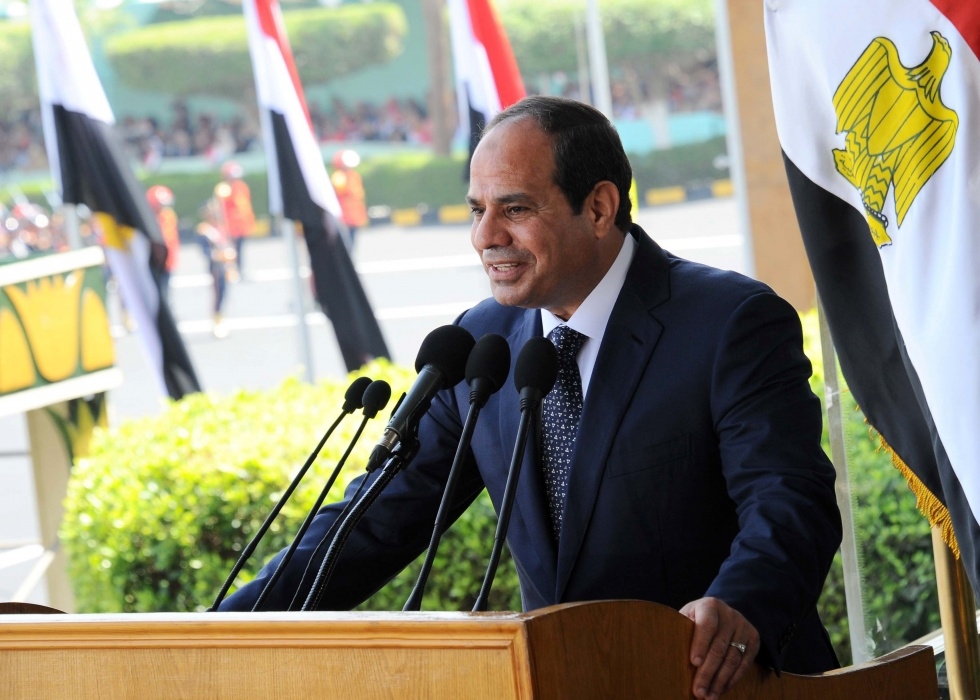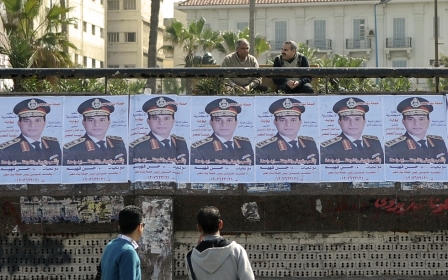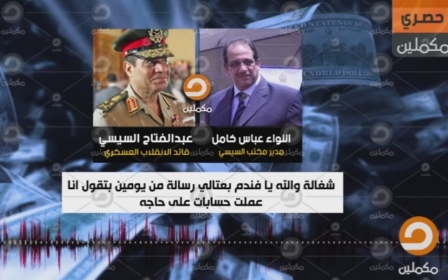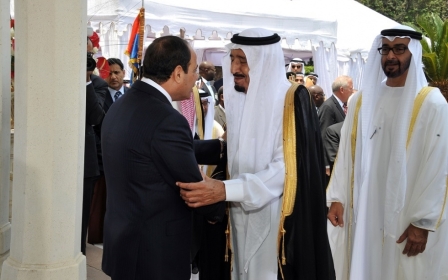Why the Mekameleen tapes could topple Sisi’s government

British police investigating allegations that the Egyptian government had command and control responsibility for the torture and mistreatment of prisoners have been handed evidence authenticating a secret recording in which high-ranking officials in the office of Abdel Fattah al-Sisi discuss how to fabricate evidence about Mohammed Morsi’s illegal initial detention.
The authentication is crucial to a prosecution in Britain, as the content of the tape establishes the central role Sisi and his inner circle play in administering detentions and undermining the rule of law in Egypt. If accepted by the Crown Prosecution Service, it could be used to arrest serving or former Egyptian ministers and generals if they arrive in the jurisdiction of British courts, senior legal counsel told Middle East Eye.
Strong forensic evidence
A 30-minute section of tape was examined by the leading British laboratory of forensic speech and acoustic analysis, JP French Associates, which is headed by Peter French, Professor of Forensic Speech Science at the University of York. The laboratory provides forensic voice analysis to the British courts, as well as advice and training to international law enforcement agencies.
The forensics team was tasked with establishing whether the voice of the main participant in the discussions General Mamdouh Shahin, the legal adviser to the Supreme Council of the Armed Forces (SCAF), was genuine.
The team compared the tape to other recorded samples of his voice. Its report concluded: “We have assessed the likelihood of finding the features in the questioned recordings if Mamdouh Shahin were to have been the questioned speaker against the likelihood of finding them if the speaker were to have been another person. In carrying out the task, we have considered the degree of similarity between the reference and questioned recordings.
“We have also considered the typicality or distinctiveness of the features found in the questioned recordings as this has a bearing on how many speakers of a comparable variety of the language might be expected to share these features. On the basis of these assessments, our opinion is that the evidence provides strong support for the view that the questioned speaker is Mr Mamdouh Shahin.”
JP French rejected the possibility that the tapes, which had been broadcast by Mekameleen, a pro-Brotherhood satellite channel in Turkey, had been fabricated or manipulated electronically.
Its report stated: “There are no indications that the spoken material in the recordings has been fabricated by editing together a large number of short speech segments or utterances. It would be very difficult to create a convincing conversation in this way. Further, the speech material displays the features of natural conversations that one would expect to encounter in a genuine recording.”
This is the first time any tape broadcast by Mekameleen has been investigated, and its authenticity opens the door to other tapes being examined forensically, sources close to the satellite channel said.
Apart from the British police, the evidence will also be sent to the African Commission on Human and Peoples’ Rights which last year ordered a moratorium on death sentences in Egypt, and to the UN Human Rights Commission.
The authentication further undermines Sisi, in the eyes of his chief Gulf donor, Saudi Arabia. In subsequent leaked conversations Sisi and his kitchen cabinet disparage their Gulf donors as “half-states” and discuss how to funnel the money Egypt is getting from Saudi Arabia, Kuwait and the UAE into bank accounts used by the Egyptian army.
In a speech on Sunday, Sisi addressed himself directly to his “Gulf brothers”. He said: “Technology is being used in order to accomplish goals. I do not transgress, so how would I allow someone to transgress in front of me … our brothers in the Gulf should know that we show every respect for them and we should be vigilant toward what is done in order to create division and dissension."
“I have met with all strands of the Egyptian society, I spoke and my speech is recorded for up to one thousand hours. In the one thousand hours there is not a single violation or one abuse coming out of my mouth against anyone, not a state, not a faction, not a group and not an entity.”
‘Forgery is the order of the day’
The authenticated tapes were recorded when senior advisers to Sisi were grappling with the problem posed by Morsi’s initial detention, which was illegal under Egyptian law. Morsi was being held at a military barracks at Abu Qir naval base near Alexandria, whereas government prosecutors claimed in an earlier court hearing that he had been in the custody of the Interior Ministry.
Shahin is taped as saying if the prosecutors lose the issue of Morsi’s detention in court, the rest of the case against him, “the espionage charges and the Ittihadiyya [presidential palace] murder case [against Morsi] would collapse”.
Shahin told Abbas Kamel, Sisi’s office manager, that they need to provide prosecutors with an order of arrest signed by General Mohammad Ibrahim, the interior minister, “backdated to the day of the coup”. Shahin asked Ibrahim to make sure the order was printed in the official government records, so that the order would appear legitimate. Shahin and Kamel then talked to the commander of the base where Morsi was initially held, General Osama El-Gindy, chief of naval forces.
Shahin tried to convince the sceptical naval commander to turn his base over to the Interior Ministry, to make it appear like a prison.
Kamel and Shahin then discussed sending prison guards to the newly converted prison, as well as concocting records of visits with the real dates and names of delegations by African leaders and Egyptian human rights lawyers. To add that extra degree of authenticity, Kamel suggested adding a torture room to show how prisoners are hanged from their feet. Shahin then joked: “You can always command us. Forgery is the order of the day.”
Rodney Dixon QC who is acting in international proceedings for Morsi and the Freedom and Justice Party said: “The authentication of the tapes is pretty conclusive. The tapes show to what depths the Egyptian government is prepared to descend to manipulate the legal process and circumvent the rule of law and international standards. They show that the legal process is not independent of government."
Dixon said that they would make the evidence available not only to Morsi’s legal team in Egypt but also to the African Commission on Human and Peoples’ Rights and the UK police. “In the UK, although this evidence does not go directly to the issue of whether torture has been used, it shows the extent to which the Egyptian government has put itself in a command and control position. We will be asking the police to take this into account in determining the responsibility of members of the government for the mistreatment of detainees.”
New MEE newsletter: Jerusalem Dispatch
Sign up to get the latest insights and analysis on Israel-Palestine, alongside Turkey Unpacked and other MEE newsletters
Middle East Eye delivers independent and unrivalled coverage and analysis of the Middle East, North Africa and beyond. To learn more about republishing this content and the associated fees, please fill out this form. More about MEE can be found here.




